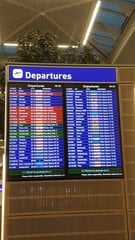Air passengers whose flights are delayed by over three hours generally have a right to compensation – but what happens if the cause of the delay is an air traffic control (ATC) decision? The Court of Appeal considered that issue in an important test case.
 What should have been a short flight from London Gatwick Airport to Brussels was delayed by about six hours and a disgruntled passenger sought compensation from the relevant airline under Regulation (EC) No.261/2004. The airline, however, pointed out that ATC at Gatwick had forbidden the departure of eastbound flights due to an outbreak of thunderstorms in the area.
What should have been a short flight from London Gatwick Airport to Brussels was delayed by about six hours and a disgruntled passenger sought compensation from the relevant airline under Regulation (EC) No.261/2004. The airline, however, pointed out that ATC at Gatwick had forbidden the departure of eastbound flights due to an outbreak of thunderstorms in the area.
The passenger’s claim was rejected by a judge on the basis that the ATC instruction amounted to an extraordinary circumstance within the meaning of the Regulation. ATC at Gatwick was not under the control of the airline and it could not have avoided the delay even if all reasonable measures had been taken. That ruling was subsequently confirmed by a more senior judge.
In challenging the latter ruling, the passenger’s lawyers argued that it was necessary to look at the underlying reason for the ATC instruction. The thunderstorms were a commonplace occurrence and could not amount to an extraordinary circumstance. The dismissal of the passenger’s claim provided airlines with a ‘get out of jail free card’ that could be played every time delays were caused by ATC decisions.
In dismissing the appeal, however, the Court noted that the Regulation could not be clearer in stating that extraordinary circumstances should be deemed to exist where ATC instructions cause a long delay to a particular aircraft, on a particular day. It was therefore not necessary for the Court to analyse the motives behind such instructions or the circumstances in which they come to be issued.
The Court also identified powerful policy reasons why the passenger’s claim should fail. Airlines generally have no control over ATC decisions and lengthy debates as to the merits of individual instructions would be disproportionate to the typical value of claims arising from delayed flights. The Court found that, in any event, the reason why the flight did not take off on time was not the thunderstorms but the ATC instruction, which it would have been unlawful and unwise for the pilot to ignore.

